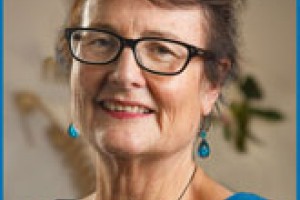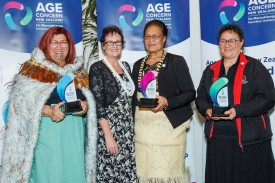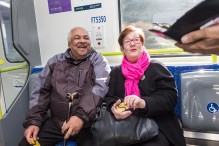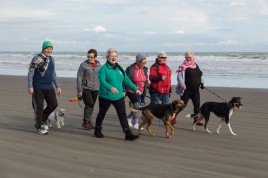
INTERVIEW: Dignity, wellbeing, equity and respect for older people our guiding lights, says Age Concern NZ CE
HPF recently welcomed Age Concern New Zealand’s Chief Executive Karen Billings-Jensen to its Board. A registered social worker by background, Karen has had extensive experience in managing and delivering services across the NGO sector.
In this indepth interview we asked Karen to share a bit about herself and her mahi, as well as some of the pressing challenges, and opportunities, that Aotearoa’s growing older population presents for Age Concern New Zealand.
We were also keen to learn more about Age Concern New Zealand’s new brand, and inaugural Huia Awards, which were both launched last year as well as the Memorandum of Understanding that the charity recently signed with Stats NZ to give older people more support in the March 7 Census.
Also find out more about how you can support, and get involved, with this amazing organisation!
Q: We’d love to know a bit more about you. Can you please share with us a bit about yourself and your background?
A: I am a registered social worker by background and my career since the early 1990s has been focused on the NGO sector. I am a Wellingtonian born and bred apart from 3 years living in London from 1988. I had been involved in youth work prior to my time in the UK, and while over there I started volunteering with a youth group and also a soup kitchen. That ignited my passion to return to New Zealand and start my social work studies.
Q: You’re a registered social worker and have had extensive management and leadership experience across the NGO sector. Can you give us some insight into your professional background, and how this has shaped your journey to where you are today?
A: My first experience of an NGO was while I was studying and I worked with the national office of the Stroke Foundation. Once I had finished my initial Massey study, I joined the Wellington City Mission, which at that stage was a small team. My first role was managing the foodbank and it is a truly humbling space to be where people are coming to ask for food assistance.
I was fortunate to be able to grow a social work service alongside the foodbank and budgeting service as I am always reminded that people’s lives and their environments are complex.
 I then spent 3 years as the manager of the YWCA of Wellington and the Hutt Valley, which was a very small NGO and underlined for me the reality of the hand-to-mouth existence of some of the key supports in our communities.
I then spent 3 years as the manager of the YWCA of Wellington and the Hutt Valley, which was a very small NGO and underlined for me the reality of the hand-to-mouth existence of some of the key supports in our communities.
Moving to Barnardos for the next 17 years enabled me to support social services right across the country and recognise the importance of national consistency and local responsiveness. We always need to find ways to ensure that the voices of those we work with are listened to, while leveraging off the good things that a centralised system can bring (policies, national visibility and relationships etc). I truly believe that my practice and leadership now is influenced by every client, every colleague and every manager I have worked with.
Q: You joined Age Concern NZ in March last year. What attracted you to the role, and what have been some of your major priorities in your mahi over the past year?
A: As you can see in my previous roles, the things that have driven me are to be in places where I think I can make a difference. Working in the children’s sector for so long, I was driven by a belief in equity, voice, accessibility and reducing vulnerability.
Moving into the older person’s sector I think the same things are important and continue to drive me. I was attracted by the history and mahi of Age Concern across the country and the reflection of local communities in their structures and services.
This past year has been a wonderful privilege to get to know the people and the work of local Age Concerns and to see where Age Concern New Zealand can add value to their work as well as ensure that we advocate nationally on issues that concern all older people.
The launch of our Visual Identity project, our Huia awards and the re-looking at our strategic plan have been  highlights.
highlights.
Q: Last year Age Concern New Zealand also launched a new brand. What motivated this change, and what are some of the qualities that your new brand represents?
A: Our new brand reflects the leadership role Age Concern holds and the respect we hold for our elders. We are shifting the perceptions of ageing, standing up to ageist attitudes and policy, and focusing on programmes and activities that support dignity, wellbeing and social connections
Leadership, mana and community—the qualities we want our brand to represent and these are the themes that inspired our new logo and visual identity.
The Huia feather is a sacred treasure for Māori, symbolising leadership and mana. Huia feathers were traditionally given as tokens of friendship.
The bold contemporary design uses individual Huia feathers to suggest the mana of our older adults and the leadership role Age Concern takes. The circle of three feathers portrays the concept of community, friendship, and respect—all things we value and uphold!
Through our re-brand, we acknowledge the exciting diversity of our population and our aspiration to be there for all older New Zealanders.
Q: It was encouraging to see that Age Concern New Zealand recently signed a Memorandum of Understanding with Stats NZ to give older people more support in the March 7 Census. Can you elaborate on what type of support will be offered, and how this will operate? How valuable is Census information to organisations such as Age Concern New Zealand?
 A: Age Concern New Zealand signed a Memorandum of Understanding with Stats NZ to ensure older people have the support they need to be counted in the 2023 Census.
A: Age Concern New Zealand signed a Memorandum of Understanding with Stats NZ to ensure older people have the support they need to be counted in the 2023 Census.
On 7 March 2023 Stats NZ will conduct a nationwide census to collect information about the people of Aotearoa New Zealand and where they live or stay. The information helps community groups, iwi, councils, businesses, and government make decisions about how much to fund and where to locate services – such as healthcare and housing.
Census information is really valuable to Age Concern New Zealand because it provides us with quality data. This helps us to determine what support and where support is needed for older people and gives us better data on our ageing population for forecasting into the future. Knowing this information is a huge help when applying for funding, delivering services, and maintaining our paid and volunteer workforce.
Most Age Concern sites will be equipped to help people complete their census forms, for example by supporting those who don’t have internet access. They will also be able to help older people, or point them in the right direction, to get paper and large print paper forms, resources in te reo Māori, New Zealand Sign language and other languages, and even assist older people to complete the census online or on paper forms.
Q: What are some of the challenges and opportunities that Aotearoa’s growing older population presents for Age Concern New Zealand, especially with Māori, Pasifika, refugee and migrant older adults?
A: We are fortunate to have a growing and increasingly diverse older population in Aotearoa; within a decade there will be close to 1.2 million New Zealanders aged 65+. Māori, Pasifika and Asian New Zealanders are growing at particularly high rates.
be close to 1.2 million New Zealanders aged 65+. Māori, Pasifika and Asian New Zealanders are growing at particularly high rates.
The increasing diversity of older New Zealanders offers both significant challenges and opportunities for Age Concern New Zealand and Aotearoa as a whole. The various population groups have differing aspirations and needs for us to respond to effectively.
Older New Zealanders are staying in the workforce for longer now and an increasing number are older renters rather than homeowners. Preparing for retirement is a challenge New Zealanders of all ages need to think about, especially with cost-of-living increases.
Our older population contributes hugely to our communities, with many volunteering for charities like ours or other organisations. Older adults frequently fill the role of carer for family members, including grandchildren, partners, and parents. Achieving equitable outcomes for Māori, Pasifika, refugee, and migrant populations is a goal we all need to contribute to. We’re very excited to have opportunity to work alongside others to meet the changing and diverse needs of our ageing population.
Q: Age Concern New Zealand runs a number of programmes and activities for older people including ‘health promotion activities’. Can you give us an example of some of these programmes/activities and what sort of feedback you get from those who participate in them?
 A: Age Concerns offer many health promotion activities including falls prevention, exercise groups, keeping safe online, how to use a smart phone or digital device, healthy eating for older adults, classroom-based driving refreshers and companion walking. We offer regular and one-off opportunities to learn about a range of topics including enduring power of attorney, improving sleep, housing options and advanced care planning,
A: Age Concerns offer many health promotion activities including falls prevention, exercise groups, keeping safe online, how to use a smart phone or digital device, healthy eating for older adults, classroom-based driving refreshers and companion walking. We offer regular and one-off opportunities to learn about a range of topics including enduring power of attorney, improving sleep, housing options and advanced care planning,
One of our kay national programmes is Steady as You Go© , an evidence-based falls prevention programme, About 5000 older people attend these classes on a weekly basis.
Participant feedback on our activities is extremely positive. Participants tell us about their improved physical and mental wellbeing, increased knowledge and the huge benefit gained from connecting with others, especially when attending regular activities.
Q: The inaugural Age Concern New Zealand Huia Awards were held last year. Can you tell us more about these awards?
A: The Huia Awards are an annual celebration of New Zealand’s older people and those who support them. Each year Age Concern New Zealand awards three recipients a Huia Award. Nominations must show how recipients support older people in Aotearoa and make positive difference.
The Huia Awards ceremony will be part of our International Day of Older Persons celebration each year (1 October).
Q: For those of us who would like to get involved with Age Concern New Zealand to help support the health and wellbeing of older people, what are some of ways we can get involved?
A: Become a Dignity Champion.
We need New Zealanders from all walks of life to join us and become Age Concern Dignity Champions. A Dignity Champion is someone who pledges to fight ageism and support the dignity, rights and respect of all older people in New Zealand. By supporting Age Concern New Zealand, our Dignity Champions will help us help our grandparents, our parents, ourselves, and one day – our children, to live well and age well.
www.ageconcern.org.nz
Q: Is there anything else you’d like to add?
A: Age Concern is the charity in your neighbourhood supporting older people, their friends and whānau.
Dignity, wellbeing, equity, and respect for older people are our guiding lights.
We are the place to go if you need to know anything about getting older and what that looks like in Aotearoa New Zealand.
People trust us to deliver results in our communities. We’re connected and have become the go-to place for anything related to ageing. If we can’t help, we know someone who can.